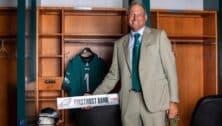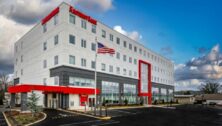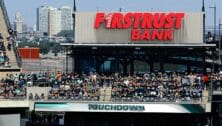As Longtime Sponsor of Philly Chamber’s Annual Economic Outlook, Firstrust Bank Underscores Its Commitment to Region’s Economic Development
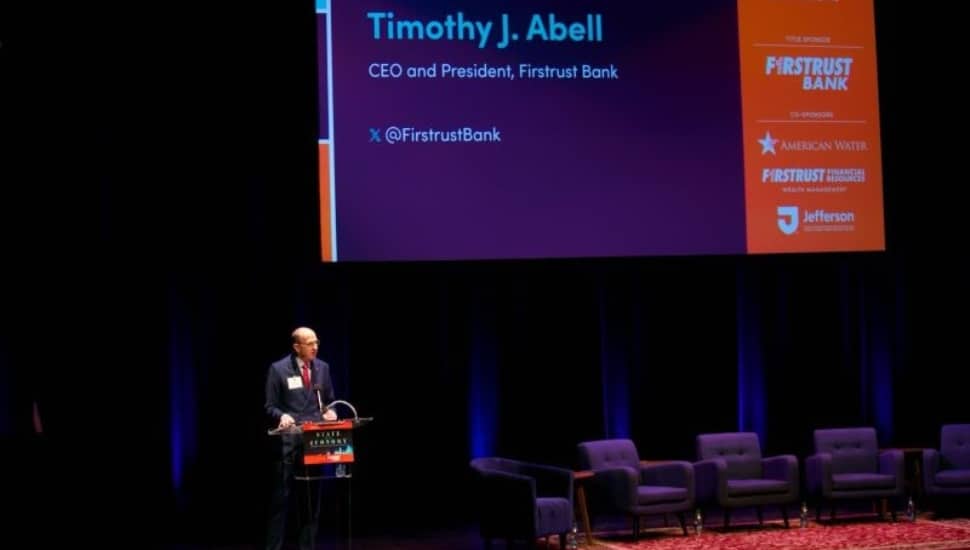
For the 14th consecutive year, Firstrust Bank — Philadelphia’s Hometown Bank, which was founded during the Great Depression — sponsored The Chamber of Commerce for Greater Philadelphia’s economic outlook, held last week at the Kimmel Center.
The bank’s support of the annual event underscores its commitment to the region’s economic development.
“What I think is unique about Firstrust Bank is that, as a $5 billion bank, we’re able to do very sophisticated things for our clients but do it with the touch of a family business,” said Firstrust Bank CEO and President Tim Abell. “We really know that relationships matter and that our success is dependent upon helping our customers be successful, in any economic cycle. That’s one of the reasons why we enjoy sponsoring this event.”
Keynote speaker Phil Mackintosh, Chief Economist and Senior Vice President at Nasdaq, offered his insights on the current and future state of the national and global economy.
“We know that the Fed’s dot plot (a chart updated quarterly that records projections for the short-term interest rate) is in a good place,” said Mackintosh. “The economy is slowing down. It’s fading; though, it’s not failing. The whole recession speak seems to have left the vocabulary. Rates should fall and maybe even fall faster than the market thinks they’re going to fall this year.”
A panel comprised of local business leaders — including Jodie Harris, President of the Philadelphia Industrial Development Corporation (PIDC); Roc Armenter, Executive Vice President of the Federal Reserve Bank of Philadelphia; Drexel University President John Fry; and Kathryn Ott Lovell, CEO of the Philadelphia Visitor Center Corporation — then spotlighted the business community’s most significant opportunities in the year ahead.
Armenter discussed the results of a survey the Philly Fed conducted of chamber members in November and how the majority of respondents possessed a better outlook for their businesses heading into 2024, compared to 2023.
“Fewer and fewer people talk about supply-chain disruptions as a big issue,” said Armenter. “I see quite a bit of optimism. Almost half of the respondents expect the economic activity of their companies to be higher next year than this year.”
Philadelphia has outperformed other metro areas in its recovery from the pandemic, due in large part to the city’s diverse range of employers, as well as Center City’s increase in population over the last few years.
“Everyone talks about eds and meds, and we have growing life sciences, but Philadelphia really benefits from having a strong small business community, a really strong creative and maker community,” said Harris. “We’re more diverse in employers than we promote … and if you look at metros that are still trying to recover, it’s really because they only have one or two major employers, and a lot of those employers have positions that don’t rely on people being in the office.”
Harris touted “the way that Philly works, the way that Philly lives” as the strength of its economy.
“We have a good combination of visitors, workers, and residents in our downtown area — people who are invested in spending their dollars where they live and where they work,” she said. “In most cities where you don’t see a lot of recovery from the pandemic, it’s because they don’t have the seven-day traffic from all three of these groups.”
Overall, the path to 2024 holds promise for the Philadelphia region, but it will require businesses to strategically navigate the evolving nature of work and the cost and availability of labor.
Connect With Your Community
Subscribe to stay informed!
"*" indicates required fields


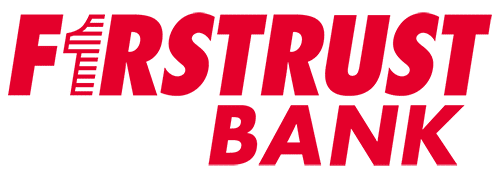




































![95000-1023_ACJ_BannerAd[1]](https://vista.today/wp-content/uploads/2023/03/95000-1023_ACJ_BannerAd1.jpg)






